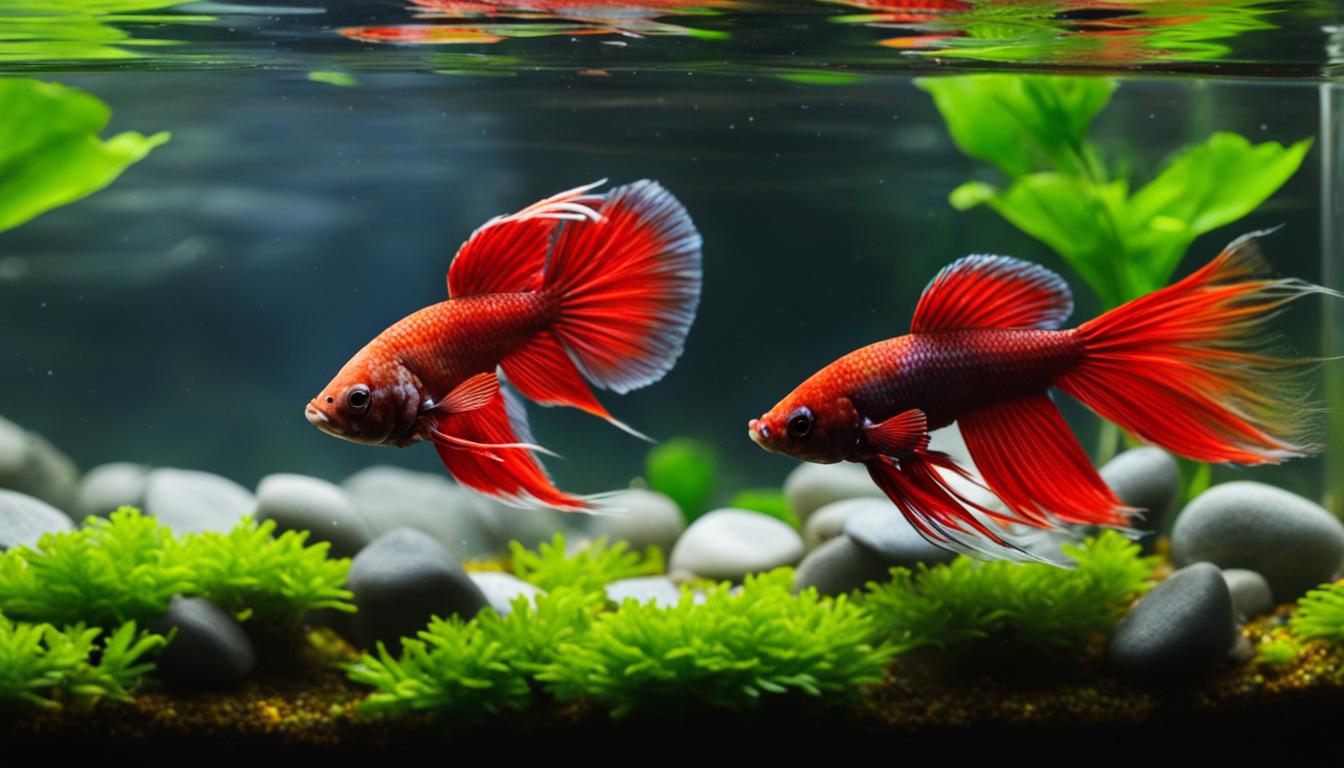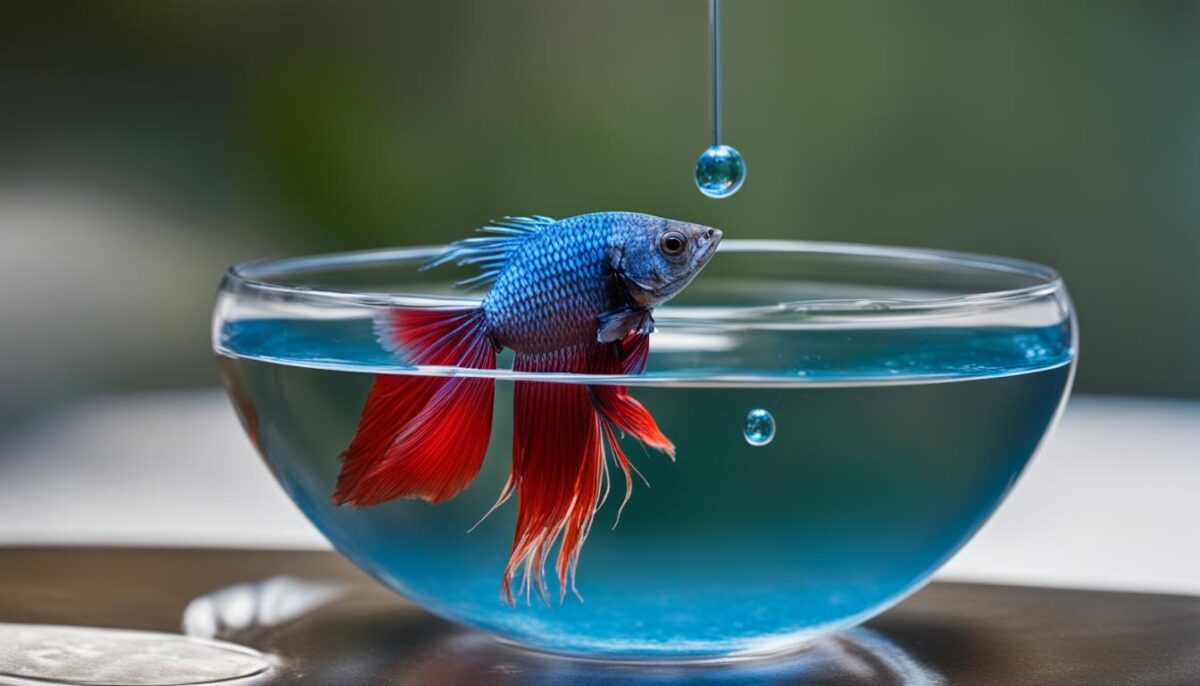Betta fish are incredible creatures that bring color and life to your aquarium. So, it’s only natural to be concerned when you notice that your betta fish isn’t moving much. In this article, we’ll dive into the possible reasons behind your betta’s stillness and what you can do to help them thrive.
Key Takeaways:
- Inactivity can be a sign of sleep, water temperature issues, or poor water quality.
- Betta fish do sleep and rest, but excessive stillness might indicate a problem.
- Monitoring the water temperature and maintaining water quality is essential for your betta fish’s well-being.
- Reviving your betta’s vibrancy involves monitoring sleep patterns, maintaining water temperature, water quality, and a clean environment.
- Understanding your betta fish’s behavior and taking proactive care is crucial for their health and happiness.
Betta Fish Sleep and Rest
Did you know that betta fish sleep? While they don’t have eyelids, they do take rest periods and become very still during these times. Excessive inactivity might be a sign of something more concerning, and it’s important to pay close attention to your betta’s behavior.
Just like humans, betta fish need their rest too. During their sleep, bettas find calm and relaxation, allowing their bodies to recharge. Even without eyelids, betta fish do have sleep cycles where they enter a state of deep rest. It’s perfectly natural for them to be motionless for extended periods.
However, while bettas do sleep, prolonged or excessive inactivity might indicate an underlying issue. It’s crucial to determine if your betta fish is getting enough rest or if there’s something more concerning affecting their behavior.
When observing your betta fish, keep an eye out for:
- Unusual sleeping patterns
- Extended periods of inactivity
- Lack of response to stimuli
These signs might indicate that your betta fish is experiencing stress, discomfort, or even illness. Creating a serene and comfortable environment is essential for their well-being.
Creating a Peaceful Environment for Your Betta Fish
To promote healthy sleep and rest for your betta fish, consider the following tips:
- Adequate tank size: Provide your betta fish with a spacious tank that allows them to swim freely. A cramped environment can cause stress and disrupt their sleep.
- Proper water conditions: Maintain optimal water parameters, including temperature, pH, and cleanliness. Betta fish thrive in water temperatures between 78-80°F (25-27°C).
- Consistent light and darkness: Ensure your betta fish has a regular day and night cycle by incorporating a light source that mimics natural lighting.
- Hideouts and plants: Adding decorations like plants and caves provide hiding spots and resting areas for your betta fish.
By implementing these measures, you can help create a peaceful and comfortable environment that promotes healthy sleep and rest for your betta fish. Remember, a well-rested betta is a happy and vibrant betta!
Water Temperature and Quality
Proper water temperature and quality play a vital role in the health and activity of your betta fish. As tropical creatures, bettas thrive in warm water environments. If the water temperature is too cold, it can make them sluggish and inactive. Monitoring and maintaining the correct water temperature is essential to keep your betta fish healthy and active.
Additionally, water quality also greatly affects the well-being of your betta. High levels of ammonia can be toxic and negatively impact their activity levels. It’s important to regularly test the water and take steps to maintain excellent water quality.
Ensuring the optimal water temperature and quality involves a few key steps. Firstly, use a reliable aquarium thermometer to monitor the water temperature consistently. Betta fish thrive in temperatures between 78-80°F, so make adjustments accordingly if it falls outside this range.
Secondly, maintaining good water quality is crucial. This involves regular water testing using appropriate kits to measure ammonia, nitrite, and nitrate levels. If any of these levels are high, it is important to take action to lower them. Responsible fishkeeping also includes regular water changes to remove accumulated waste and replenish the water with fresh, clean water.
A clean and well-maintained environment contributes to the overall health and vibrancy of your betta fish. With vigilant temperature monitoring and maintaining high water quality, you can ensure your betta fish remains active and happy.
Reviving Your Betta’s Vibrancy
To help your betta fish become more active, it’s important to take certain steps. You can monitor their sleeping patterns, check the water temperature regularly to ensure it’s between 78-80°F, and maintain water quality by checking pH levels and ammonia, nitrite, and nitrate levels. A clean environment is also crucial for your betta’s well-being, so regular water changes are recommended. If your betta fish continues to be inactive despite these measures, it may be necessary to seek veterinary advice to address any underlying health issues. Remember, prevention is key, so taking proactive measures to ensure your betta fish’s health is better than waiting for them to become inactive.
By being attentive to your betta fish’s needs, you can help revive their vibrancy and ensure their overall well-being. Monitoring their sleeping patterns allows you to differentiate between normal sleep and prolonged inactivity. Regularly checking the water temperature in your betta fish’s tank ensures a warm and comfortable environment, which promotes their activity levels.
Water quality plays a significant role in a betta fish’s health and behavior. By monitoring pH levels and the presence of harmful substances like ammonia, nitrite, and nitrate, you can maintain a clean and thriving aquatic environment. This encourages your betta fish to engage in their natural behaviors and exhibit their vibrant colors.
Additionally, don’t forget to perform regular water changes. This helps remove any accumulated waste or toxins that may negatively affect your betta’s health and activity levels. Aim for a partial water change of 25% every two weeks, ensuring you use a water conditioner to remove chlorine and chloramines.
However, if your betta fish remains inactive despite your best efforts, it may be an indication of an underlying health issue. Seeking veterinary advice can help identify and address any potential ailments that may be impacting their vibrancy. A veterinarian specializing in aquatic animals can provide expert guidance and recommend appropriate treatment options.
Remember, a vibrant and active betta fish is a sign of good health and well-being. Taking proactive measures to create an optimal environment for your betta can enhance their vibrancy and enrich their quality of life.
The Stillness Decoded
Understanding the reasons behind your betta fish’s inactivity is crucial for their health and happiness. It’s natural for betta fish to be still during their sleep periods, just like humans. However, if you notice that your betta fish is excessively motionless or remains still for extended periods, it may indicate an underlying issue that requires your attention.
Monitoring the water temperature and quality in your betta fish’s tank is essential for keeping them vibrant and active. Betta fish are tropical creatures and thrive in warm water, so maintaining a temperature between 78-80°F is crucial. Additionally, ensure that the water quality is optimal by regularly checking pH levels and ammonia, nitrite, and nitrate levels. A clean environment with proper water conditions will help prevent inactivity and promote your betta’s well-being.
If your betta fish continues to exhibit prolonged stillness despite maintaining ideal water conditions, seeking veterinary advice is recommended. Veterinarians specializing in aquatic animals can provide expert guidance and diagnose any underlying health issues that may be affecting your betta’s activity levels. Remember, your betta fish relies on you to be attentive and patient, as their actions are their way of communicating with you. By providing proactive care and addressing any potential concerns, you can be the best betta buddy for your aquatic friend.
FAQ
Why is my betta fish not moving?
There could be several reasons why your betta fish is not moving. It could be due to sleep or rest periods, water temperature being too cold, or poor water quality.
Do betta fish sleep?
Yes, betta fish do sleep. While they don’t have eyelids, they do take rest periods and become very still during these times.
How does water temperature and quality affect betta fish activity?
Betta fish are tropical creatures and thrive in warm water. If the water is too cold, it can make them sluggish and inactive. Additionally, poor water quality, such as high ammonia levels, can also impact their activity.
How can I help my betta fish become more active?
To help your betta fish become more active, it’s important to monitor their sleeping patterns, check the water temperature regularly, maintain water quality by checking pH levels and ammonia, nitrite, and nitrate levels, and ensure a clean environment by performing regular water changes.
When should I seek veterinary advice for my inactive betta fish?
If your betta fish continues to be inactive despite taking measures to improve their activity, it may be necessary to seek veterinary advice to address any underlying health issues.
Why should I be proactive in caring for my betta fish’s health?
Being proactive in caring for your betta fish’s health is important because understanding the reasons behind their inactivity is crucial for their well-being. Taking measures to ensure proper water temperature, quality, and cleanliness can help keep your betta fish vibrant and happy.
How should I interpret my betta fish’s stillness?
While it is normal for betta fish to be still during sleep periods, excessive or prolonged stillness may indicate an underlying issue. Being observant and patient with your betta fish’s behavior can help you understand their actions and communicate effectively with them.


